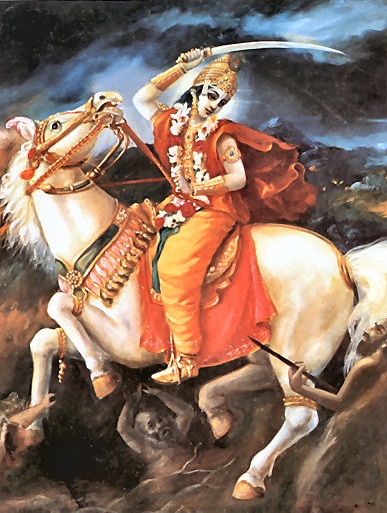(Lord Kalki)
Allen Ginsberg: Now, what is Kalki's nature?
Prabhupāda: Kalki's nature, that is described in Bhāgavata. He will come just like a prince, royal dress with sword, and on horseback, simply killing, no preaching. All rascals killed. No more preaching. That is the last. There will be no brain to understand what is God.
Allen Ginsberg: There will be no brain to understand God?
Prabhupāda: They will be so dull, so dull. It requires brain to understand. Just like in the Bhāgavata it is said that evaṁ prasanna-manaso, "fully joyful," bhagavad-bhakti-yoga, "by practice of bhakti-yoga." Evaṁ prasanna-manaso bhagavad-bhakti-yogataḥ, mukta-saṅgasya: "and freed from all material contamination." He can understand God. Do you think God is so cheap thing, anyone will understand? Because they do not understand, they present something nonsense: "God is like this. God is like that. God is like that." And when God Himself comes, that "Here I am, Kṛṣṇa," they don't accept it. They'll create their own God.
Allen Ginsberg: So Kalki comes at the end of the Kali-yuga?
Prabhupāda: Yes.
Allen Ginsberg: And is Kalki connected with the Kali-yuga cycle?
Prabhupāda: Yes. Kalki, yes.
Allen Ginsberg: So He would come at the end of Kali-yuga to end the yuga.
Prabhupāda: Yes. Then Satya-yuga will begin.
Allen Ginsberg: Then what begins?
Prabhupāda: Satya-yuga.
Allen Ginsberg: Which is?
Prabhupāda: Satya-yuga, the pious. Satya-yuga. People will be pious, truthful, long-living.
Allen Ginsberg: Are those people that remain or whatever new creation comes out of the destruction?
Prabhupāda: Some of them will remain, some of them. It will not completely extinguish. Some of them will remain, pious. Paritrāṇāya sādhūnāṁ vināśāya ca duṣkṛtām (BG 4.8). All miscreants will be killed, and out of them, there must be some pious... They remain.
Allen Ginsberg: Do you think of this in terms of a historical event that will occur in the lifetime of your disciples?
Prabhupāda: No. This will happen at least 400,000's of years after, at least. So by that time...
Allen Ginsberg: They will go down, down, down for 400,000 years?
Prabhupāda: Yes. So at that time my disciples will be with Kṛṣṇa.
Devotees: Haribol!
Prabhupāda: And those who will not follow them, they will see the fun, how they are being killed. (laughter)
Allen Ginsberg: 400,000 years. Will people still be chanting Hare Kṛṣṇa in 400,000...
Prabhupāda: No. Hare Kṛṣṇa will be finished within ten thousand years. There will be no more Hare Kṛṣṇa.
Allen Ginsberg: Ah. So what will be left?
Prabhupāda: Nothing. Left will be I'll kill you and eat you, and you shall kill me. You shall eat me. That will be left.
Allen Ginsberg: After ten thousand years?
Prabhupāda: Yes. There will be no grain, no milk, no sugar, no fruit. So I have to eat you, and you will have to eat me. Full facility for meat-eating. (laughter) Full facility. Kṛṣṇa is very kind. He'll give you facility: "All right. Why cows and calves? You take your own son. Yes. Eat nicely." Just like serpents, snakes, they eat their own offsprings, tigers. So this will happen.
Allen Ginsberg: Kali eats her own...
Prabhupāda: Yes. And there will be no brain to understand, no preacher, nothing else. Go. Go to, to the dog. And then Kṛṣṇa will come: "All right, let me kill you so that you are saved." So...
Allen Ginsberg: But you see it as actually a historical thing of ten thousand years for the chanting, of the diminishing chanting of...
Prabhupāda: Yes. These are...
Allen Ginsberg: Well, then do you think more people will chant Hare Kṛṣṇa or fewer?
Prabhupāda: Oh, yes. More people. Now it will increase.
Allen Ginsberg: Until?
Prabhupāda: Up to ten thousand years.
Allen Ginsberg: And then?
Prabhupāda: Then diminish.
Allen Ginsberg: So what is the purpose of right now, a world increase...
Prabhupāda: People will take advantage of this up to ten thousand years. Then they will...
Allen Ginsberg: So this is like the last rope, the last gasp.
Prabhupāda: Yes. So the sooner we take to shelter, shelter of Kṛṣṇa consciousness, is better.
(Srila Prabhupada Conversation, Columbia, May 13, 1969)
.
.

